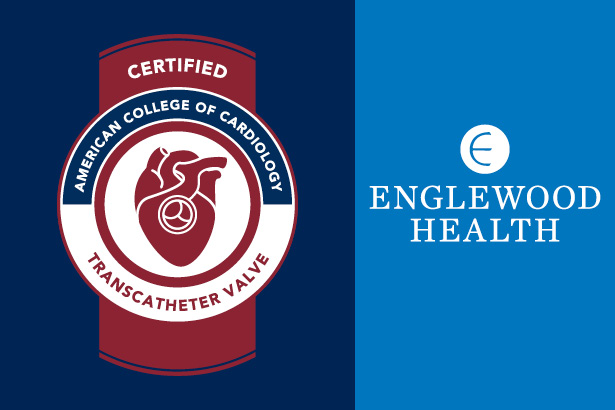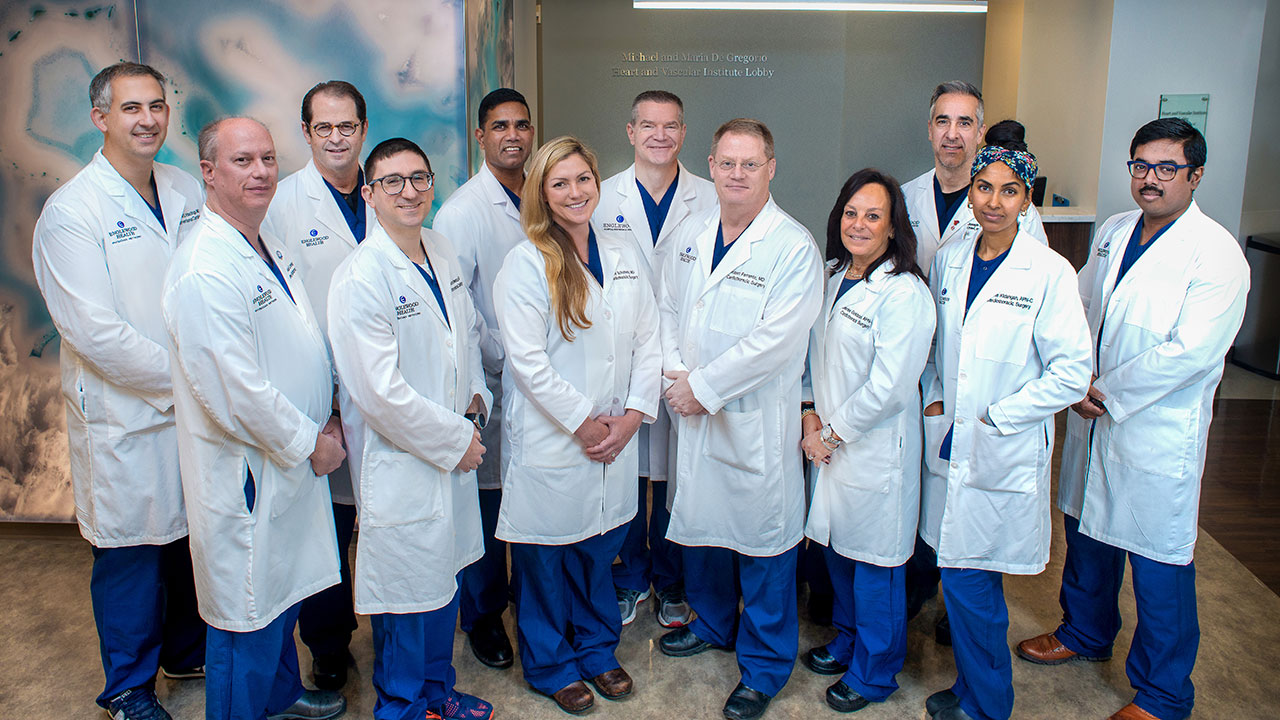
Bergen County’s first hospital to earn recognition from the American College of Cardiology for Transcatheter Valve
February 1, 2022 — Englewood Health has been recognized by the American College of Cardiology (ACC) with the Transcatheter Valve Certification. This mark of distinction reflects the accomplishments of the Structural Heart and Valve Program at Englewood Health in treating patients with valve disease such as aortic stenosis using innovative, minimally invasive procedures. Englewood Health is the first hospital in Bergen County, and among just three in the state and 70 in the country, to earn this honor.
The Transcatheter Valve Certification was awarded following a months-long process in which Englewood Health’s Structural Heart and Valve Program was evaluated for its ability to meet high standards for multidisciplinary teamwork, formalized training, shared decision-making, and high-quality performance as measured in national registries.
“Englewood Health has demonstrated its commitment to providing northern New Jersey with excellent heart care,” said Deepak L. Bhatt, MD, MPH, FACC, chair of the ACC Accreditation Management Board. “ACC Accreditation Services is proud to award Englewood Health with the Transcatheter Valve Certification.”
Englewood Health was one of the first hospitals in the country to begin offering transcatheter aortic valve replacement (TAVR)—a minimally invasive heart valve replacement procedure—following its FDA approval in 2011. The procedure is used to treat aortic stenosis, a narrowing of the heart valve that often leads to symptoms such as shortness of breath, lightheadedness, and fatigue.
“Initially, the developers of the TAVR device were very conservative in identifying medical centers with which they wanted to be involved,” said Joseph De Gregorio, MD, executive director of cardiovascular services at Englewood Health. “We had what they were looking for and fit the bill.”
“The obvious benefit of the TAVR procedure is that there is no need for open heart surgery or the use of a heart/lung machine,” said Ramin Hastings, MD, medical director of the Structural Heart and Valve Program and interventional cardiologist at Englewood Health. “In the TAVR procedure, we use a thin tube to guide a new, artificial aortic valve into the heart to replace the damaged valve. TAVR has a shorter recovery time than open-heart surgery, the traditional method of valve replacement surgery, and gives patients a much-improved quality of life.”
The TAVR procedure was originally offered as an alternative treatment for patients who were not candidates for open-heart surgery due to their age or risk for complications. Since then, it has become a desirable treatment for lower risk patients as well.
“At first, we were performing the TAVR procedure mostly on patients in their 70s, 80s, and well into their 90s, as these patients had no options to resolve symptoms from aortic stenosis,” said Adam Arnofsky, MD, chief of cardiothoracic surgery at Englewood Health. “Based on the procedure’s success, and with the FDA’s expanded approval, we’ve been able to offer this approach to a large group of patients for whom open heart surgery was the only option when medical therapy was not effective. We can now take into account patient preference in addition to risk factors and other considerations when reviewing treatment options.”

The TAVR team at Englewood Health—consisting of interventional cardiologists, cardiothoracic surgeons, and other practitioners and clinical staff who work together to perform the procedure—has observed a high success rate in patients, with outcomes better than the national average.
“The success of our program is in large part a result of our ability to provide excellent multidisciplinary care,” said Denise Goldstein, APN, the program coordinator for the Structural Heart and Valve Program at Englewood Health. “So much of what we do with TAVR patients comes before and after the actual procedure, so this achievement could not be possible without the teamwork among our professionals in the valve program and our community cardiologists.”
The Englewood Health Structural Heart and Valve Program team has performed nearly 1,200 TAVR procedures.
“Thanks to the efforts of Englewood Health’s staff of cardiology experts and the hospital’s reputable surgical infrastructure, the Structural Heart and Valve Program has become a major hub for patients with heart valve disease,” said Samuel Suede, MD, chief of cardiology at Englewood Health.
“This achievement reinforces our belief that residents of Bergen County and the surrounding area can stay in their own community to get top-notch care from a certified program,” said Richard S. Goldweit, MD, chief of interventional cardiology at Englewood Health. “It’s no longer necessary to cross the George Washington Bridge for this level of care.”
“We congratulate our entire team on this national honor, and thank them for the outstanding and transformative care provided in this important program,” said Warren Geller, president and CEO of Englewood Health. “Their care and commitment allow us to do what we do best: care for our community.”

